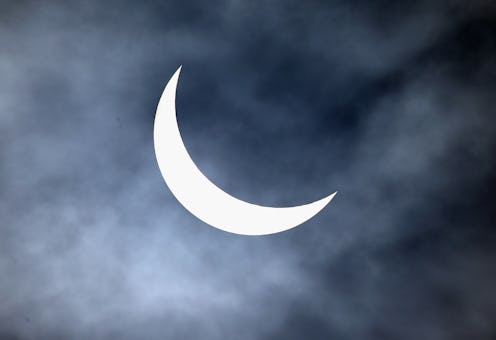News
There's A Partial Solar Eclipse Coming
There's nothing like a good solar eclipse to remind you of humanity's ultimately meager, minor role in the universe. However immersed in your own thoughts, problems and emotions you might be, the sun getting blotted out by the moon is a jarring natural phenomenon that simply won't be ignored. In that way, solar eclipses can be big, uniting events for humankind. And although it's not a full-fledged example, there will be a similar sight this weekend — if you want to watch the partial solar eclipse, here's how to do it.
Unfortunately, this one's a little tricky for would-be American viewers. As detailed by Space.com senior writer Mike Wall, you won't be able to see this impressive celestial feat if you live in the United States, or for that matter anywhere in North America. Rather, it'll be visible in the skies above South Africa, as well as in parts of nearby Mozambique and Madagascar.
Luckily, however, there's still an option for you. You can watch a live broadcast of the eclipse, which is being streamed by the folks at Slooh.com. It's going to be happening late on Saturday night/Sunday morning — the stream starts at 12:30 a.m. ET, according to CBS News — but that's way before the maximum eclipse will be visible, at about 3 a.m. ET.
I, for one, wouldn't miss it. Full solar sclipses don't come around all the time — we're not due for another one until 2016 — and even a partial version strikes a stunning image across the sky. Basically, while a full eclipse blots out the sun entirely, save for a slender loop of fire that peeks around the moon's edge, a partial eclipse creates a curved sun, a glaringly bright, solar version of that beautiful crescent moon shape.
It's also important to remember that solar eclipses should never be looked at directly without some manner of protective eyewear, although unless you're viewing it up close and personal in the South African region, you won't have to worry about that.
So, be sure you set your alarm now! Once again, if you're an east coaster who wants to catch the beginning of Slooh's broadcast, you'll want to be ready at 12:30 a.m. Sunday morning, and if you're on the west coast, 9:30 p.m. Saturday night. If you're just looking to drop in on the eclipse when it's at its height, however, you should aim for 3 a.m. ET, or midnight PT. There's just something about knowing people all around the world will be tuning in to see it, to take in that shared moment — pretty cool, right?
